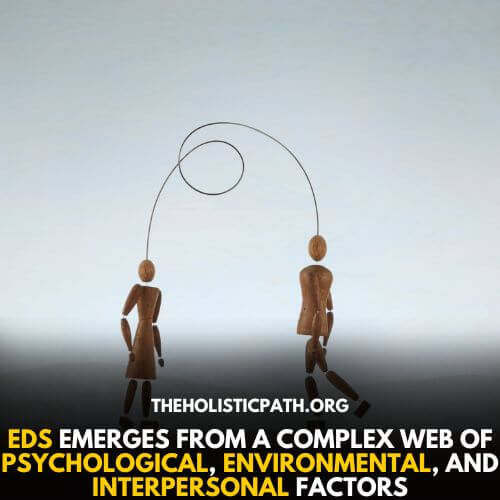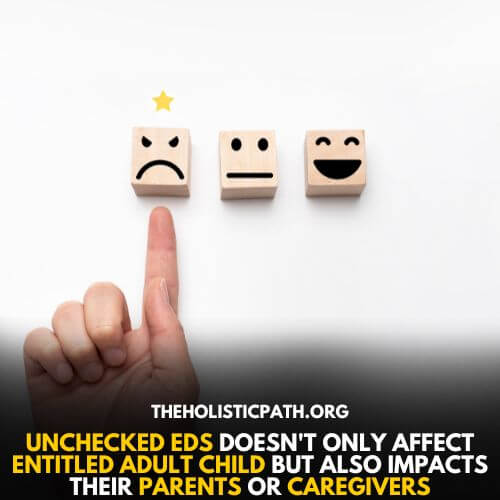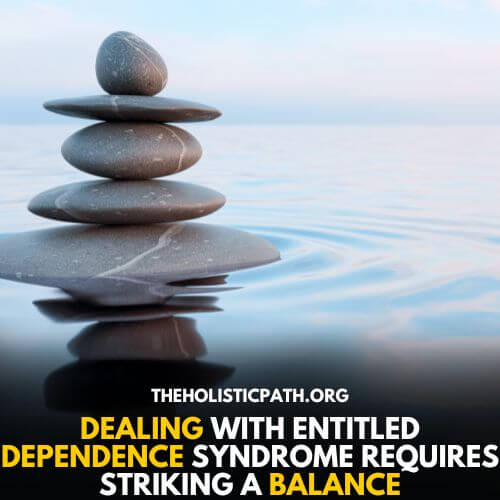Entitled Dependence Syndrome, a term describing a unique aspect of human behavior, delves into the intricate nature of our inherent reliance on others. As social creatures, we are instinctively inclined to seek connections and support from our fellow beings.
This natural interdependence forms the foundation of our social fabric, hinging on a delicate balance of give and take.
Yet, this equilibrium can falter when an individual’s dependence takes a skewed turn, fixating solely on receiving rather than reciprocating. This phenomenon gives rise to what we call Entitled Dependence Syndrome, where the scale tips towards an excessive expectation of receiving, often accompanied by a belief in deserving unwavering assistance.
In this article, we navigate the realms of human interconnectivity to understand how the harmony of dependence can veer off course, shaping the dynamics of relationships into something far more complex.
What Is Entitled Dependence Syndrome?
Entitled Dependence Syndrome refers to a pattern of behavior in which an individual excessively relies on others for various forms of support and assistance, to the point where the balance of reciprocity becomes skewed. As inherently social beings, humans naturally form bonds and connections that involve a mutual exchange of care, resources, and attention.
This give-and-take dynamic is essential for maintaining healthy relationships and societal harmony.
However, when an individual develops Entitled Dependence Syndrome, they begin to lean heavily towards the “take” aspect of this dynamic, often at the expense of offering their fair share in return. This syndrome often manifests as a failure to launch, where an individual becomes excessively fixated on receiving aid, support, or resources, while neglecting the expected reciprocation.
The concept is reminiscent of a fledgling bird that hesitates to leave the nest, perpetually relying on its parents. In human terms, individuals struggling with Entitled Dependence Syndrome expect ongoing assistance without recognizing the need for their own contributions, creating an unhealthy and unsustainable imbalance within their relationships.
In essence, Entitled Dependence Syndrome represents a deviation from the natural interdependence that humans share, manifesting as a one-sided reliance that can strain relationships and hinder personal growth.
11 Common Traits of Entitled Dependence Syndrome
Entitled Dependence Syndrome encompasses a range of distinct character traits that collectively define its intricate nature. Individuals affected by this syndrome often exhibit a set of common behaviors that reflect an imbalanced reliance on others, coupled with a skewed understanding of reciprocity. Some prominent character traits associated with Entitled Dependence Syndrome include:
-
Unreasonable Demands: Individuals with this syndrome tend to impose unrealistic expectations on others, seeking to have their needs met without considering the feasibility or fairness of their requests.
-
Persistent Resistance to ‘No’: A hallmark trait is the inability to accept ‘no’ for an answer. Those affected may struggle to acknowledge boundaries or respect the decisions of others.
-
Empathy Deficiency: A lack of empathy is a prevalent characteristic, where they may struggle to understand or appreciate the perspectives and feelings of those around them.
-
Anger and Frustration: When their unreasonable expectations are not met, individuals with Entitled Dependence Syndrome may respond with heightened anger, frustration, or even tantrums, as they struggle to cope with their perceived denial of their entitlements.
-
Arrogance: Arrogance often accompanies this syndrome, where affected individuals hold an inflated sense of their importance and entitlements, viewing themselves as deserving of special treatment.
-
Argumentative Nature: These individuals tend to be highly argumentative, engaging in disputes over matters that others might perceive as minor. This combative approach stems from their rigid stance on getting what they believe they deserve.
-
High-Conflict Personalities: A proclivity for conflict characterizes their interactions, as they may engage in frequent disputes and disagreements, further straining relationships with others.
-
Gratitude Challenges: Gratitude may elude them, as they struggle to appreciate the efforts made by others on their behalf, focusing instead on what they perceive as lacking or owed to them.
-
Dependency on Others: The core of the syndrome lies in an excessive dependence on others for emotional, financial, or practical support, often to the point of inhibiting personal growth and independence.
-
Avoidance of Responsibility: Those grappling with this syndrome may evade responsibility or accountability, placing the onus on others to solve their problems or fulfill their needs.
-
Reluctance to Self-Initiate: Averse to initiating actions independently, they may wait for others to step in and address their needs, reinforcing their reliance on external support.
These character traits collectively underscore the intricate and multifaceted nature of Entitled Dependence Syndrome, shedding light on the challenges individuals face when their understanding of mutual interdependence becomes skewed towards an exaggerated sense of entitlement.

Major Causes of Entitled Dependence Syndrome
Entitled Dependence Syndrome emerges from a complex web of psychological, environmental, and interpersonal factors. Understanding these underlying components provides valuable insights into the development and perpetuation of this syndrome.
As we explore the contributing elements, we gain a deeper appreciation for the delicate balance between healthy interdependence and the risk of skewed entitlement. Here are some of the common causes:
1. Psychological Factors: The Internal Landscape
At the heart of Entitled Dependence Syndrome lie various psychological factors that contribute to its emergence. These factors often stem from an individual’s upbringing, personality traits, and emotional experiences.
-
Low Self-Esteem and Insecurity: Individuals with low self-esteem and heightened insecurities might seek external validation and support to compensate for their perceived inadequacies. This reliance on others to bolster their self-worth can develop into an entitled dependence on constant affirmation and assistance.
-
Fear of Autonomy: Some individuals harbor an underlying fear of independence due to past failures, trauma, or anxiety. This fear can lead them to avoid taking personal responsibility, fostering a cycle of dependence on others to navigate life’s challenges.
-
Maladaptive Coping Mechanisms: Entitled Dependence Syndrome can arise as a maladaptive coping mechanism, especially in those who lack healthy strategies for managing stress, anxiety, or emotional distress. Relying excessively on others for comfort or solutions can become a habitual response.
2. Environmental Influences: Nurturing Entitlement
The external environment plays a pivotal role in nurturing and reinforcing Entitled Dependence Syndrome. Social, familial, and cultural dynamics contribute to the development of this syndrome.
-
Overprotective Parenting: An upbringing marked by overprotective parenting or excessive assistance can hinder the development of self-sufficiency. Children who grow up with constant intervention may struggle to acquire essential life skills and develop a sense of autonomy.
-
Unrealistic Expectations: Societal and cultural pressures can shape unrealistic expectations about entitlement and success. When these expectations go unmet, individuals might seek unwarranted support as a means of fulfilling perceived societal norms.
-
Instant Gratification Culture: In a world of instant gratification and quick solutions, individuals may become conditioned to expect immediate help and support. This cultural norm can contribute to the development of Entitled Dependence Syndrome, as individuals become less willing to invest effort in solving their problems independently.
3. Interpersonal Dynamics: Relationships and Role Perceptions
Interpersonal relationships significantly influence the onset and progression of Entitled Dependence Syndrome. How individuals perceive their roles and those of others within relationships can shape their attitudes and behaviors.
-
Unbalanced Power Dynamics: Relationships characterized by imbalanced power dynamics can foster a sense of entitlement in one party. For example, a person with a history of providing constant support may inadvertently encourage dependency in their partner.
-
Perceived Obligations: If an individual believes that others owe them assistance due to their role or history, they may develop an entitled outlook. This can manifest in situations where they expect help without considering the reciprocity that healthy relationships require.
-
Emotional Manipulation: Some individuals employ emotional manipulation to elicit help from others. Whether consciously or unconsciously, they may use guilt, anger, or other emotional tactics to secure the support they desire.
3 Basic Types of Entitled Dependence Syndrome
Entitled Dependence Syndrome (EDS) is a controversial diagnosis that has been used to describe a wide range of problems. The term was first introduced in the early 1990s by Doctor Nathaniel Lehrman, who used it to describe a pattern of behavior he saw in some of his patients.
Over the years, the diagnosis has been expanded to include a variety of different symptoms and behavior patterns. Today, there is still no consensus on what EDS actually is, and there are no official diagnostic criteria. However, there are three general types of EDS that are commonly recognized: type I, type II, and type III.
- Type I EDS – Obsession: Type I EDS is characterized by a sense of entitlement and an obsessive preoccupation with meeting one’s own needs. Individuals with type I EDS often have difficulty empathizing with others and may be excessively self-centered and self-absorbed. They may also be manipulative and controlling.
- Type II EDS – Excessive Self-Importance: Type II EDS is characterized by a sense of entitlement and an inflated sense of self-importance. Individuals with type II EDS often believe that they are better than others and deserving of special treatment. They may be arrogant and condescending, and they may have a strong need for admiration.
- Type III EDS – Absence of Empathy: Type III EDS is characterized by a sense of entitlement and an inability to empathize with others. Individuals with type III EDS often lack empathy and may be callous and insensitive. They may also be particularly prone to aggression and violence.
Entitled Dependence Syndrome Diagnostic Criteria
Entitled Dependence Syndrome can be a difficult disorder to treat, but there are a few diagnostic criteria that can be used to identify it. Below are some of the points for the diagnostic criteria:
- The person has a strong need or craving for the substance.
- The person has difficulty controlling their use of the substance.
- The person suffers negative consequences as a result of their substance use, such as problems with work, school, or home life.
- The person continues to use the substance despite knowing that it is causing them harm.

5 Negative Effects of Entitled Dependence Syndrome Going Unnoticed
When entitled dependence syndrome goes unnoticed, it can give rise to a cascade of negative consequences, as outlined by Julie Exline, a prominent figure in psychological sciences from Case Western Reserve University. This syndrome, where an individual feels entitled to special treatment and remains dependent on others for their needs, can lead to profound and lasting detriments for both the parents and the entitled adult children involved.
Drawing from Exline’s insights, the progression of unchecked entitled dependence syndrome can be understood through a series of stages:
- Stage 1: The initial phase involves the development of entitlement. This mindset sets the individual up for a continuous cycle of having their expectations elevated and specific needs met. However, these expectations often do not align with reality, increasing the likelihood of perpetual disappointment and dissatisfaction.
- Stage 2: The unmet expectations lead to emotional distress. When these individuals consistently encounter situations where their entitlement isn’t fulfilled, they experience heightened feelings of frustration, anger, and sadness. This emotional turmoil can translate into a persistent state of unhappiness and discontent.
- Stage 3: In an attempt to cope with their emotional distress, entitled individuals create internal narratives that bolster their sense of superiority. They convince themselves that they deserve special treatment and consideration, reinforcing their entitlement. This reinforcement further intensifies their expectations, perpetuating the cycle anew.
Unchecked entitled dependence syndrome doesn’t only affect the entitled adult child but also impacts their parents or caregivers. The parents, driven by love and concern, might inadvertently enable this behavior by continually catering to their child’s demands. In the short term, this might provide a semblance of comfort, but in the long run, it can lead to a damaging scenario.
If this syndrome remains unnoticed and unaddressed, it can culminate in several undesirable outcomes:
- Chronic Unhappiness: Entitled individuals are more likely to experience chronic unhappiness due to the constant disconnect between their high expectations and the reality of life’s challenges.
- Distressed Relationships: The entitled person’s interpersonal relationships can suffer due to their self-centered outlook, leading to strained interactions and fractured connections.
- Emotional Turmoil: The emotional distress caused by unmet entitlement can trigger stress, anxiety, and feelings of inadequacy, contributing to an overall decline in mental well-being.
- Reduced Independence: The lack of personal growth and self-sufficiency can hinder an entitled adult child’s ability to thrive independently in society.
- Future Uncertainty: When parents are no longer able to provide support, the entitled adult child might find themselves ill-equipped to manage life’s challenges and responsibilities.
Julie Exline’s perspective emphasizes that intervention is crucial to break this cycle. While the syndrome’s effects can be damaging, there is hope for change. Even if the entitled individual is an adult, timely intervention through therapy and support can help them develop healthier perspectives and behaviors.
For parents, it is imperative to recognize the potential harm of enabling such behavior and to take steps to encourage their child’s growth and independence. Ultimately, addressing entitled dependence syndrome can lead to improved well-being, better relationships, and a more fulfilling life for both the entitled individual and their caregivers.
How Do You Deal With Entitled Dependence Syndrome? 4 Simple Things To Try
Dealing with entitled dependence syndrome requires a comprehensive approach that involves both the entitled individual and those around them, such as parents, caregivers, or close family members. Here are several steps to consider when navigating this challenging situation:
1. Enmeshment: Establishing Healthy Boundaries
Enmeshment refers to an unhealthy emotional closeness or dependency between individuals, often resulting in blurred personal boundaries. To address entitled dependence syndrome, it’s crucial to establish and maintain healthy boundaries:
-
Recognize Enmeshment Patterns: Identify signs of enmeshment, such as difficulty making decisions without seeking approval, emotional reliance on others, and a lack of individual identity.
-
Communication is Key: Initiate open and honest conversations with the individual displaying entitled dependence tendencies. Discuss the importance of boundaries, emphasizing the value of personal autonomy and self-reliance.
-
Encourage Individuality: Promote activities that encourage the development of individual interests and hobbies. This helps the person establish their own identity outside of their dependency.
2. Adult-Child Dynamic: Shifting Roles and Responsibilities
Understanding the adult-child dynamic is essential when dealing with entitled dependence syndrome, as it can often involve individuals assuming childlike roles even in adulthood. Facilitating a shift towards more balanced roles can promote personal growth:
-
Acknowledge Adult Responsibilities: Gently remind the individual of their responsibilities as an adult, such as managing their finances, making decisions, and taking care of their own well-being.
-
Empower Decision-Making: Encourage the individual to make decisions independently. Offer support and guidance, but allow them to experience the consequences of their choices.
-
Promote Self-Care: Highlight the importance of self-care and stress the role of self-sufficiency in maintaining emotional and physical well-being.

3. Proportionate Compassion: Balancing Support and Accountability
Dealing with entitled dependence syndrome requires striking a balance between providing support and holding individuals accountable for their actions:
-
Empathetic Listening: Show empathy by actively listening to their concerns, but avoid immediately offering solutions. Instead, guide them to find their own solutions.
-
Set Expectations: Clearly communicate your expectations for their behavior and contributions. Reinforce the idea that everyone has a role to play within a family or community.
-
Reward Progress: Recognize and reward instances of responsible behavior and independent decision-making. Positive reinforcement can motivate them to continue taking steps towards self-reliance.
4. Developing Life Skills: Fostering Independence
To break free from entitled dependence, individuals need to develop essential life skills that empower them to navigate the challenges of adulthood:
-
Identify Skill Gaps: Assess areas where the individual lacks essential life skills, such as budgeting, time management, cooking, or basic household chores.
-
Skill-Building Activities: Engage them in skill-building activities, providing guidance as they learn new skills. This can boost their confidence and sense of accomplishment.
-
Progressive Challenges: Gradually increase the complexity of challenges, allowing them to progressively take on more responsibility and build confidence in their ability to handle different aspects of life.
Dealing with entitled dependence syndrome requires patience, consistency, and a holistic approach that addresses emotional, psychological, and practical aspects. By implementing these strategies, you can help individuals transition from a state of dependence to one of self-reliance and personal growth.
Conclusion
Dependence syndrome is a serious condition that can have a profound impact on an individual’s life. If left untreated, it can lead to social isolation, financial problems, and even physical health problems.
However, with proper treatment and support, people with dependence syndrome can learn to manage their condition and live fulfilling lives. If you or someone you know is struggling with dependence syndrome, don’t hesitate to seek help.
There are many resources available to provide support and assistance. With the right help, you can overcome these challenges and lead a happy and successful life.
References:
Front. Psychol., (03 June 2022). Sense of Relationship Entitlement of Aging Parents Toward Their Offspring (SRE-ao)—A New Concept and Measurement Tool. https://www.frontiersin.org/articles/10.3389/fpsyg.2022.885620/full
Eli Lebowitz, Dan Dulberger, Efi Nortov, Haim Omer (March 2012). Parent Training in Nonviolent Resistance for Adult Entitled Dependence. https://www.researchgate.net/publication/221721416_Parent_Training_in_Nonviolent_Resistance_for_Adult_Entitled_Dependence
